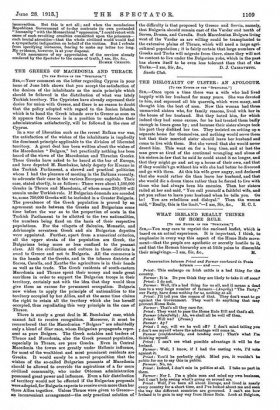THE GREEKS OF MACEDONIA AND THRACE.
[To THE EDITOR OF THE "SPECTATOR."] SIR,—Your comment on the letter regarding Cyprus in your issue of June 14th shows that you accept the satisfaction of the desires of the inhabitants as the main principle which should be followed in the distribution of what was lately Turkish territory. The Cypriotes have already expressed their desire for union with Greece, and there is no reason to doubt that the policy adopted with regard to the Ionian. Islands, which is to hand the Greek islands over to Greece as soon as it appears that Greece is in a position to undertake their administration satisfactorily, will be followed in the case of Cyprus.
In a war of liberation such as the recent Balkan war was, the satisfaction of the wishes of the inhabitants is impliedly the dominant principle applicable to the division of liberated territory. A great deal has been written about the wishes of the Macedonian " Bulgars," but practically nothing has been heard of the views of the Macedonian and Thracian Greeks. These Greeks have asked to be heard at the bar of Europe, and have deputed M. Bambakas, lately deputy for Kosane in the Turkish Parliament, a shrewd and practical politician whom I had the pleasure of meeting in the Balkans recently, to advocate their case in the various European capitals. Their case, stated shortly, is as follows : There were about 1,500,000 Greeks in Thrace and Macedonia, of whom some 250,000 will remain under Turkish rule. If Bulgarian demands are acceded to, some 750,000 Greeks will be included in a Greater Bulgaria. The prevalence of the Greek population is proved by an agreement made between the Greeks and Bulgarians some time before the war as to the proportion of seats in the Turkish Parliament to be allotted to the two nationalities, the numbers being fixed on the basis of their respective populations. For the vilayets of Selonica, Monastir, and Adrianople seventeen Greek and six Bulgarian deputies were appointed. Further, apart from a numerical criterion, all the upper strata of the population are Greek, the Bulgarians being more or less confined to the peasant class. All the civilization and culture in these districts is owed to Greece and not to Bulgaria. All the commerce is in the hands of the Greeks, and in the tobacco districts of Serres, Cavalla, and Xanthe the agriculture is in their hands as well as the trade. The Greek residents of south-eastern Macedonia and Thrace spent their money and made great sacrifices in order to support the Bulgarian troops in their territory, certainly not with the idea that they would thus give them an excuse for permanent occupation. Bulgaria now wishes to apply the principle of nationalities to the territory occupied by her Allies, and at the same time claims the right to retain all the territory which she has herself occupied, thus repudiating this very principle in the case of Thrace.
There is surely a great deal in M. Bambakas' case, which cannot fail to receive recognition. Moreover, it must be remembered that the Macedonian "Bulgars" are admittedly only a blend of Slav race, whom Bulgarian propaganda repre- sent as pure Bulgars. The Greek notables and traders of Thrace and Macedonia, also the Greek peasant population, especially in Thrace, are pure Greeks. Even in Central Macedonia the towns are greatly under Hellenic influence, for most of the wealthiest and most prominent residents are Greeks. It would surely be a novel proposition that the wishes of the so-called Bulgarian peasants of Macedonia should be allowed to override the aspirations of a far more civilized community, who under Ottoman administration possessed great power and influence. Even a fair distribution of territory would not be effected if the Bulgarian proposals were adopted, for Bulgaria expects to receive even more than her three Allies together. Unless Thrace were given to Greece— an inconvenient arrangement—the only practical solution of
the difficulty is that proposed by Greece and Servia, namely, that Bulgaria should remain east of the Vardar and north of Serres, Drama, and Cavalla. Such Macedonian Bulgars living west of the Vardar as are willing could be transplanted to the extensive plains of Thrace, which will need a large agri- cultural population ; it is fairly certain that large numbers of Greeks and Turks will migrate from there, since they will not be content to live under the Bulgarian yoke, which in the past has shown itself to be even less tolerant than that of the


























































 Previous page
Previous page